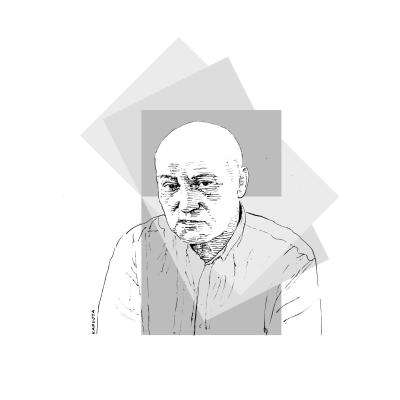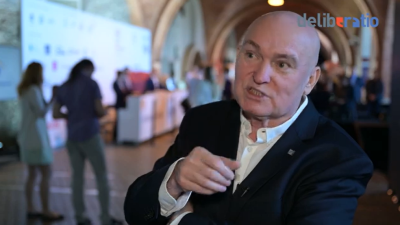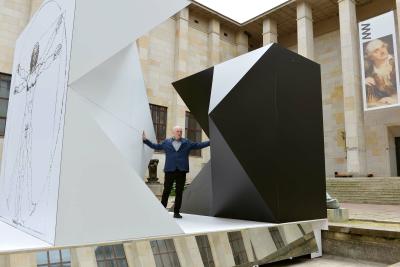In connection with his book Basquiat - A New York Film Story, which was published in Poland at the end of the 1990s, Lech Majewski held a number of meetings. One of them took place in Łódź. He wrote about the painter: "Basquiat has been called the Black van Gogh or the Hendrix of the Art World. He passed like a meteor through the New York scene and died, like Hendrix, Joplin and Morrison, at the age of twenty-seven, from a heroin overdose'. Painter was the most recognisable and most expensive selling black artist. He owed this somewhat to Andy Warhol, who, fascinated by his energy and disarming freedom, introduced him to the most serious art houses. After finishing Prisoner of Rio, Lech stayed with us in Brooklyn for a while. It was then that Basquiat passed away and a big article by Anthony Haden-Guest that appeared about him in Vanity Fair I gave Lech to read. In his book 'The Official Centre of the World', Lech wrote "...in New York, six months later, through a coincidence (do they exist? Leibniz says there are no coincidences - there are only laws we don't know) and a friendship with Janusz, who gave me an article telling me about Basquiat's death...". The text shocked Lech. He met the author and through him reached people who knew Basquiat. One of them was Julian Schnabel. At the time, Schnabel was almost, or even certainly, considered the most important living painter. He also acted as such. He proposed to Lech to collaborate on the script. He agreed and it was his quickest entry into the world's most serious art market and into the circle of its animators. However, their leadership personalities could not stand each other and there was a separation. For an appropriate sum, Schnabel bought back the rights to the script for two years and decided to direct this film himself, His first film. Shooting began two days before the deadline. If it was missed, both the script and the film rights would revert to Lech and he would go on to produce and direct. The film Basquiat premiered in1996. Lech has two credits in the film, as author of the story on which the script was based and as co-producer. Schnabel's film starred David Bowie, Dennis Hopper, Gary Oldman and Jeffrey Wright, who played Basquiat.
As I watched another of Schnabel's captivating and moving films, The diving bell and the butterfly, I thought of the uncharted ways of Providence. By inconspicuously handing in a newspaper article, I provoked a situation that made Schnabel a director. An excellent director. I had a sense of some strangely interconnected nature of the universe, which connects seemingly unrelated events. We live in the embrace of chance, but chance is God's last chance to get our attention*.
How do we understand chance? What is providence? What is our free will and what is necessity - questions that every human being must ask themselves at some point. When the time came for me, like Blaise Pascal I made a certain choice. His idea was later called Pascal's wager. Pascal, after excelling in mathematics, physics, philosophy, towards the end of his short life - he lived for 37 years - had an epiphany and devoted himself unreservedly to God. He thought and wrote. Wanting to convince people of God, but probably above all himself - he developed a certain wager based on the calculus of probability (Pascal was one of the creators of this calculus). "God is or He is not. If God is there and we believe in him we attain eternal life; if God is there and we do not believe in him - we only live our trivial number of years losing hope for eternity. If there is no God and we believe in him - our mistake is disproportionately small in relation to the gain made by the faith just promising eternity. Pascal writes: "... if you win, you gain everything: if you lose you lose nothing. Bet therefore that it is, without hesitation". Even the threat of being wrong also makes sense - at most during your life: "...you will be faithful, honest, humble, grateful, charitable, friendly, sincere, truthful." (Blaise Pascal, Thoughts, Pax Warsaw 1989, pp. 232, 233, 236). And how can one not choose faith, if only in the name of the aforementioned "honesty", "truthfulness" and "friendship"! And if there is no God and we believe in him, we are left with the fragility of the world, the meaninglessness of his appearance, the absence of hope and a few books by Marx, Lenin or Dawkins. And futility.
My 'bet' was, of course, simpler and primarily referred to me. I don't know whether life is random or not. But I am aware of both possibilities and I realise what they promise; either life is random and it is difficult to attach any meaning to its duration, or it is not random and the things that happen, even though we do not fully understand them, have a reason and a purpose. I accepted the latter possibility. I assumed that from now on I would treat the events in my life as non-accidental. That is, they will have to happen. There are very significant and pragmatic consequences from this simple assumption. My encounters with people are - at least on my part - more important because I am more attentive. Every person in my life becomes a necessary and inalienable human being. Gifted. Even if I don't understand it immediately - everyone has a meaning. My encounter with him is unique and special. In my journey - and I have no other - I do not look for more important, smarter or more interesting encounters. I care about each person. Every encounter is important, wise and interesting. People become the substance of my life, the world and my reveries about it. There is nothing without nothing. There is no wiser world than the one in our heads. I was born in a village with 100 people. I had a concrete Mother Marianna and I had my Father Michael. Everything in this world is important. Or nothing is important. In a scattered world you really only need a few rules, which if you accept and negotiate with life, you nevertheless have to follow.
Later, in the American-Indian physician, writer, philosopher Deepak Chopra's book 'How to know God, The Soul's Journey into the Mystery o Mysteries' (Three Rivers Press, New York, 2000), I read that man has seven stages in his development of building an image of God (God being what he is) and only at the fifth level is he able to see that life is not random. By accepting at the outset that my life is not random, and by accepting Chopra's hierarchy, I was in a sense ahead of my eventual development. Being at a lower level, I behaved towards the cosmos as if I were more aware and literate. Because otherwise what we would like to be, repeated incessantly, must become our second nature. Even apparent self-deception and incomprehensible aspirations become, if honestly willed, a proper or real life after years.
In the intoxicating socialism of the 1960s at primary school, I got an A for the fact that there is a Lord God and an A for the fact that there is no Lord God. I went to classes at school and separately to religion classes. I was a good student. Getting an A, then the highest grade, seemed to me a very simple and easy task. You had to go to class, listen to what the teacher was saying and when he asked afterwards what he was saying - literally repeat it back to him.
But those metaphorical two A's above all meant that I had a learned amount of arguments fairly defending each side. So it wasn't until 1970, at the beginning of my studies at the Faculty of Architecture at the Warsaw University of Technology, when I first began to think on my own account that this much more fundamental question came to me - Is there or isn't there? How is it possible that we make two contradictory statements about God/god and believe in them very deeply. How is it possible that we humans, after so many years of existence, are unable to answer it conclusively? To be continued.
*Sentence from my book 'Plus Minus, a handbook for thinking', Zysk and S-ka, 2014.










Comments (0)